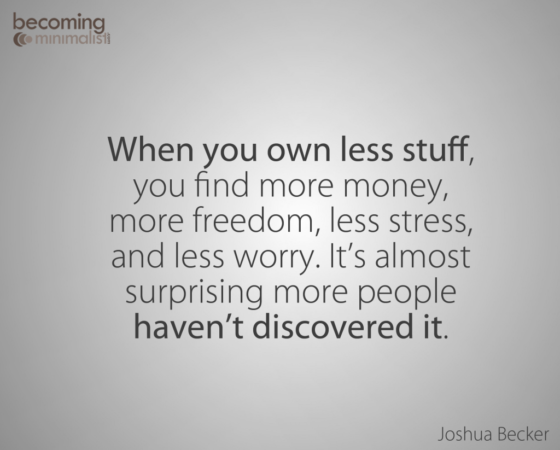
Two articles I recently read reinforced my feeling that most people have too much “stuff”.
Beth Teitell writes in the Boston Globe, “Clutter…can assume many forms. It can present as a once-used bread machine or Lego hair that’s come unsnapped from its person. It can look like Tupperware without its assigned top, garden tools when there’s no garden, expired coupons, a bottle of hardened glue, a mushy basketball that will never again bounce. In 2012, after several years of observing humans living among clutter…UCLA-affiliated social scientists concluded that families are prisoners of their own clutter, so overwhelmed by junk they often can’t park their cars in the garage, and that managing the volume of possessions raises stress hormones.” She continues:
- Six years later, the clutter is still winning — but it’s certainly not for lack of effort on our part.
- People are buying shelving units and baskets and see-through plastic containers that hold one pair of shoes, convinced that with the right storage, they can conquer their demons, both physical and psychological.
- The desperate are paying professional organizers up to $150 per hour to force them to face facts.
- “You are never going to be a size four again,” Hogan, the Boston organizer, tells clients, “and if you are, it’s because you are sick.”
Meanwhile, in this piece, I learned about the booming self-storage industry. “Despite recessions and demographic shifts, few building types have boomed like self-storage lockers. In fact, they’ve proven to be one of the surest bets in real estate over the last half century, while malls, starter homes, and even luxury commercial space in big cities, once safe and steady investments, have struggled…One in 11 Americans pays an average of $91.14 per month to use self-storage.”
That’s a lot of money for, in most cases, lockers filled with old clothing, furniture, and keepsakes. It is my strong belief: if you need offsite storage, you have way too much stuff.
“Once they sign up,” the article continues, “renters become captive audiences, according to the Wall Street Journal…consumers join and forget about it…they’re often willing to accept slight increases in cost, rather than deal with the hassle of moving their possessions across town to a competitor’s warehouse.”
Managing your possessions at home is stressful. Storing them off-site costs money. Those are good reasons to cut down on what you own.
As I wrote about earlier this year, the amount of “stuff” I threw out when helping my parents move from a house to an apartment was incredible. It’s far better to donate, or throw out, along the way, rather than accumulating things you don’t need.
There are organizations—our county and our bank, to name two—that have periodic, free shredding days—but those days are for a “normal” amount of paper, not 50-years’ worth. My dad had to pay hundreds of dollars to have his old tax returns, credit card bills, and other documents shredded. If, instead of accumulating them over the decades, he had disposed of them every year, as we do in my house, he could have saved that money. It would have also saved the hassle and time spent going through everything for the move. And he would have been just as happy, or likely happier, for all those years without all that clutter.
What’s your experience with throwing out or donating things you do not use, rather than letting them collect dust? Please join the conversation with your comments…
Happy 4th!
David
